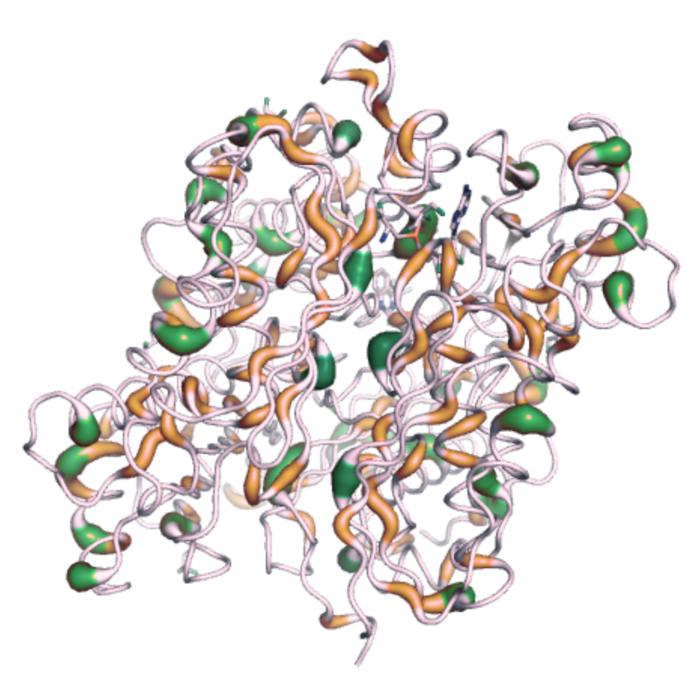Clinical stage artificial intelligence (AI)-driven drug discovery company Insilico Medicine (“Insilico”) announces that it has received approval from the U.S. Food and Drug Administration (FDA) for its Investigational New Drug (IND) application for ISM3412, a small molecule inhibitor of MAT2A for the potential treatment of MTAP deleted cancers designed with Insilico’s generative AI platform.

Credit: Insilico Medicine
Clinical stage artificial intelligence (AI)-driven drug discovery company Insilico Medicine (“Insilico”) announces that it has received approval from the U.S. Food and Drug Administration (FDA) for its Investigational New Drug (IND) application for ISM3412, a small molecule inhibitor of MAT2A for the potential treatment of MTAP deleted cancers designed with Insilico’s generative AI platform.
With the IND approval, Insilico is approved to launch a Phase I multicenter, open label study of ISM3412 as a single agent in adult subjects with locally advanced and metastatic solid tumors with primary endpoints to include safety, tolerability, recommended Phase II dose determination and preliminary efficacy. All subjects will receive oral daily dosing of ISM3412 as a monotherapy, and additional expansion arms are planned across multiple indications.
ISM3412 is a potentially best-in-class, orally available small molecule inhibitor of MAT2A that has demonstrated excellent drug-likeness with good solubility and permeability, good anti-tumor efficacy at low doses in animal models, and a favorable safety profile in preclinical studies. The molecule was designed using ligand-based AI-enabled drug design by Insilico’s generative chemistry application, Chemistry42.
“We are thrilled to gain FDA approval to advance our latest synthetic lethality anti-cancer therapeutic, ISM3412, for the potential treatment of cancer with MTAP deletion, which is seen in 15% of all cancers,” says Sujata Rao, MD, Chief Medical Officer of Insilico Medicine. “There are many patients awaiting new therapeutic options.”
MAT2A (methionine adenosyltransferase 2A) is one of several synthetic lethality targets being explored by Insilico Medicine as a promising new avenue for treating cancers that have eluded other forms of therapy. With synthetic lethality, two simultaneous genetic events – driven by a highly optimized therapeutic – result in cell death.
MTAP is an enzyme important to cell function, and MTAP deletion is one of the most common gene deletions seen in cancers – including non-small cell lung cancer, bladder cancer and pancreatic cancer – and is associated with poor prognosis.
It can be targeted through MAT2A, an enzyme that plays an essential role in cell function and survival and the primary producer of S-adenosylmethionine (SAM), the universal methyl donor. Inhibition of MAT2A reduces the level of SAM, and ultimately inhibits the proliferation of MTAP-/- cancers.
“Generative AI has proven to be an invaluable tool in the fight against cancer,” says Alex Zhavoronkov, PhD, founder and CEO of Insilico Medicine, “and we are eager to advance this latest synthetic lethality inhibitor – our 7th AI-designed molecule to receive IND approval – as a new treatment avenue for some of the most aggressive cancers.”
ISM3412 is part of a growing portfolio of AI-designed synthetic lethality candidates in Insilico’s pipeline. Another, ISM3091, is a potentially best-in-class inhibitor for ubiquitin-specific protease 1 (USP1), an enzyme that contributes to DNA repair in cancer cells and has demonstrated promise against homologous recombination deficient-(HRD) tumors, including in BRCA-mutant cancer cells. In Sept. 2023, Insilico entered into an exclusive global licensing agreement with Exelixis granting Exelixis the rights to develop and commercialize ISM3091 and other USP1-targeting compounds, in exchange for an $80 million upfront payment.
Insilico is a pioneer in using generative AI for drug discovery and development. The Company first described the concept of using generative AI for the design of novel molecules in a peer-reviewed journal in 2016. Then, Insilico developed and validated multiple approaches and features for its generative adversarial network (GAN)-based AI platform and integrated those algorithms into the commercially available Pharma.AI platform, which includes generative biology, chemistry, and medicine and has been used to produce a robust pipeline of promising therapeutic assets in multiple disease areas, including fibrosis, cancer, immunology and aging-related disease, a number of which have been licensed. Since 2021, Insilico has nominated 18 preclinical candidates in its comprehensive portfolio of over 30 assets and has advanced six pipelines to the clinical stage. In March 2024, the Company published a paper in Nature Biotechnology that discloses the raw experimental data and the preclinical and clinical evaluation of its lead drug – a potentially first-in-class TNIK inhibitor for the treatment of idiopathic pulmonary fibrosis discovered and designed using generative AI currently in Phase II trials with patients.
About Insilico Medicine
Insilico Medicine, a global clinical-stage biotechnology company powered by generative AI, connects biology, chemistry, and clinical trial analysis using next-generation AI systems. The company has developed AI platforms that utilize deep generative models, reinforcement learning, transformers, and other modern machine learning techniques for novel target discovery and generating novel molecular structures with desired properties. Insilico Medicine is developing breakthrough solutions to discover and develop innovative drugs for cancer, fibrosis, immunity, central nervous system diseases, infectious diseases, autoimmune diseases, and aging-related diseases. www.insilico.com



